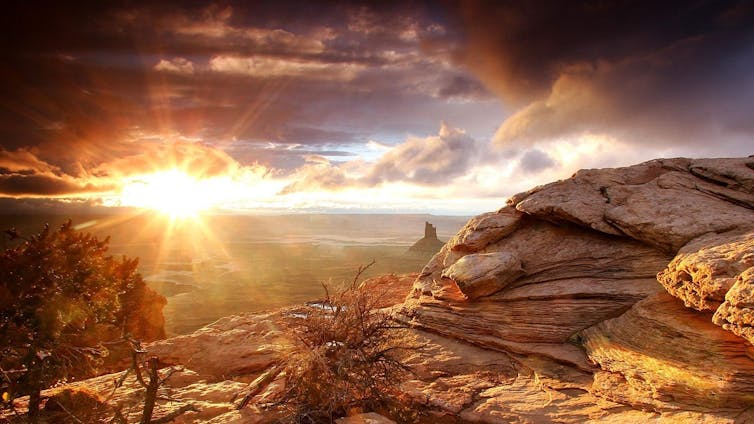
The Earth’s biosphere teems with life. From its upper atmosphere to the depths of its oceans, even down into the rocks that make up the planet’s crust. All of it, all these billions of tonnes of carbon-based lifeforms will at some point cease to metabolise, cease to reproduce, cease to be alive. At which point their substance returns to the great biogeochemical cycles and in time becomes something else.
Rather than being morbid, reflecting on death and what it means in a planetary perspective can lead us to better appreciate our lives, and what we may achieve during them.
Every species currently alive will one day become extinct. Around 99.9% of all species that have existed have shuffled off that way. They had their time on Earth, and then that particular sequence of genetic information was lost forever. Evolution is nothing if not profligate.
Even the Earth’s biosphere, the environment that sustains us and everything else, will one day die. Our sun is a yellow dwarf (that something 333,000 times more massive than the Earth is a “dwarf” gives some indication of just how big stars can be). Over the course of its 4.5 billion years lifetime, our sun has increased in brightness by about 25%. It will continue to do so over the next couple of billion years, during which it will consume millions of tonnes of hydrogen fuel every single second. Stellar evolution too, is nothing if not profligate.
As the sun decreases in mass, the gravitational forces that keep it together lessen, and so it expands in size. This greater surface area will radiate more and more energy down onto the Earth. Eventually the oceans will boil and the solar wind will blow the atmosphere into space. Lighter rocks will be eroded away to leave a molten ball of metal that may even be consumed by the sun itself, if it expands far enough to reach the Earth’s orbit around it.
So if the Earth is the only planet in the universe that has life, and if we assume that Homo sapiens will go the way of all other species – perhaps distinguishing itself with self-obliteration in some socio-ecological catastrophe before being able to establish colonies on other planets – then that would be the end of our universe’s experiment with animated matter. Life, to put it another way.
This is perhaps the bleakest perspective on the fundamentally finite nature of life. It should be immediately mitigated with the realisation that it’s quite possible there are a staggeringly large number of planets in our galaxy alone, not to mention the rest of the universe. Many potential homes for life in the cosmos. However, this doesn’t address the finiteness of our being. What does it matter if bug-eyed aliens are boggling at our biosphere’s life signature through their telescopes light years away? We don’t want to die.
There are clear evolutionary advantages in having a strong aversion to dying. In one sense, our entire bodies are built to ensure we survive. We sometimes fight for our lives. We battle cancer. Wars are often great spurs for developments in science and technology. Our conflict with mortality has in the past few centuries produced major increases in the average human lifespan, and overall quality of life. Alas, such improvements have not been uniformly distributed, so while about a billion go hungry, a further billion over-eat with many dying much sooner than would be otherwise expected. The collateral damage of industrialisation that powered such advances threatens to significantly undo some of our most impressive achievements. Rather than more of everything, there are very good arguments for distributing what we have more equitably so that we can provide a safe and just space for humanity.
The matter that we borrow for our bodies is subject to the ultimate fate of the Universe. You may believe that your soul or spirit could even survive the end of spacetime as we know it. What we do know is that our physical bodies will at some point perish. You can amass wealth and possessions beyond imagination. None of this will change the fact that you are going to die.
What will last – not forever, but potentially centuries into the future, perhaps even beyond the lifetime of our species – is the impact that you have on the biosphere. That’s quite an awesome responsibility. It is also an opportunity to have something survive your death: those things you value here on Earth, and with them your hopes that others will enjoy them when their time comes to live on our home planet.
“There is no real ending. It’s just the place where you stop the story.” Frank Herbert
